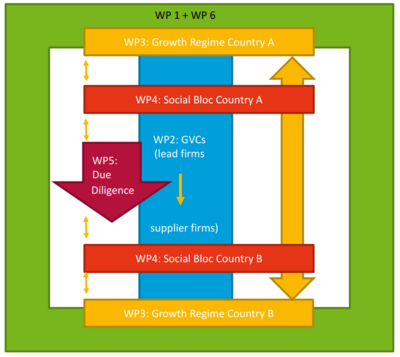Value Chain Restructuring, Growth Regimes and Economic and Social Resilience
Description of Project
The “HWR Research Competence Centre: Challenges and Resilience of Global Supply and Value Chains” is devoted to the further development of interdisciplinary theories, models and generation of new insights to better understand the resilience of global supply and value chains, with a focus on the impact of crises. The research centre has five competence clusters, and it is comprised of different disciplines, such as sociology, criminology, security studies, business administration, economics, political science and law.
Funded by DFG (German Research Foundation), 5 years with a possible extension to 8 years
Thematic Competence Cluster B:
“The relationship of value chain reconfiguration with interdependent growth regimes and effects on economic and social resilience”
Team
- Dr. Ümit Akcay
- Juan Manuel Campana
- Prof. Dr. Eckhard Hein
- Anne Martin
- Prof. Dr. Stefanie Lorenzen
- Prof. Dr. Christina Teipen
Description of the Competence Cluster B
Thematic Cluster B examines the relationship of value chain reconfiguration with interdependent growth regimes and effects on economic and social resilience in the context of varying degrees of globalization. It consists of six work packages (WP), with their interrelation and process described in Figure 1.

Figure 1. Outline of Thematic Cluster B, framing the process in terms of work packages and their interrelation.
WP 1: Theoretical and conceptual foundations
This WP aims to develop a conceptual framework that integrates the three theoretical strands of global value chains, demand and growth regimes and dominant social blocs including new legal approaches. The results of WP 1 will provide the theoretical and conceptual framework for the other WPs. WP 1 will involve all researchers of Competence Cluster B.
WP 2: Global Value Chains (GVCs)
This WP aims to analyze the role of institutions, social actors (such as trade unions), and power relationships in restructuring processes, exploring how different actors within GVCs have adapted to the current period of multiple crises. This WP is led by Prof. Christina Teipen and involves Anne Martin as an associated researcher.
WP 3: Demand and Growth Regimes (DGRs)
This WP aims to analyze the long-term trajectories of demand and growth regimes in both developed and emerging capitalist economies, and the global interplay among them. This WP is led by Prof. Eckhard Hein and involves Juan Manuel Campana as an associated researcher.
WP 4: Dominant Social Blocs (DSBs)
This WP aims to analyze the social underpinnings of DGRs, GVC integration, and the conditions that generate stability and change. This includes examining the diverging interests of producer groups, trade unions, political actors, and growth strategies. This WP is led by Dr. Ümit Akcay as a post-doc researcher.
WP 5: New Legal Approaches
This WP aims to explore the current strategy of regulation through mandatory Human Rights and Environmental Due Diligence (mHRDD) laws, and its impact on the social resilience of GVCs theoretically and empirically. This WP is led by Prof. Stefanie Lorenzen and involves a research assistant.
WP 6: Synthesis
This WP aims to integrate the outcomes of WPs 1-5. Theoretically, we will formulate a research agenda applicable across diverse cases, examining the advantages and constraints of employing such an interdisciplinary approach. Empirically, we will consolidate our findings on the interconnections among changes in GVCs, DGRs, and DSBs in both advanced and emerging economies. Finally, we will explore the potential impacts of a broader progressive economic policy approach, encompassing economic, ecological, and social sustainability, on the future evolution of GVCs, DGRs, DSBs, and legal frameworks.